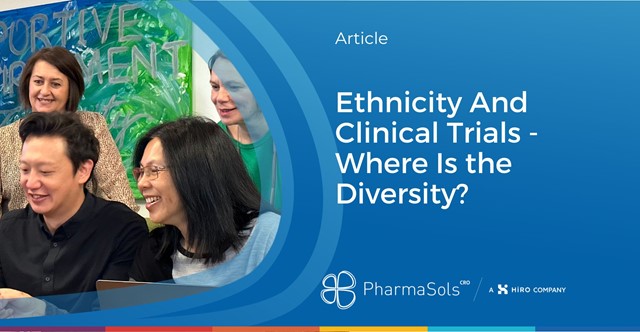14 Dec
Ethnicity And Clinical Trials - Where Is the Diversity?

One of the most important aspects of a clinical trial is that it represents a diverse ethnic profile.
For a pharmaceutical product to be accepted by international regulatory bodies such as the FDA and the EMA, it is essential that the patient recruitment process places ethnic diversity as a priority.
It will also mean that the treatment will have the potential to be widely distributed and impact the health of those who possibly need it most.
However, this is often a pain point for many biotechs, as they may come up against challenges that hinder their ability to recruit the diversity required for the study. These challenges may include not having access to the right channels to engage these ethnic groups or experiencing resistance within the minority group due to mistrust in the medical community.
Why is it important?
When it comes to the success of clinical trials, patient recruitment and retention play a pivotal role. It is imperative to recruit the targeted patient population to obtain high-quality clinical data that meet the standards of international regulatory bodies such as the FDA and EMA. Failure to meet recruitment targets or failure to gather a diverse population pool can compromise the quality of clinical data, leading to potential rejection of the regulatory application by the FDA or EMA.
Other than acceptance by regulatory bodies, ensuring diversity is important for several reasons:
Increased generalisability of results
Due to their unique genetic characteristics, different ethnic groups may respond differently to medical treatments. Including a diverse range of participants in clinical trials ensures that the results are applicable to a wider population.
Effectiveness and safety across populations
Genetic, environmental, and cultural factors can influence how individuals respond to medical interventions. By including diverse participants, researchers can identify potential differences in treatment effectiveness and safety, leading to a better understanding of how a drug or therapy may impact different populations.
Precision medicine advancements
Understanding genetic diversity across different ethnic groups is essential for advancing precision medicine, which aims to tailor medical treatments to individual characteristics, including genetic makeup. This will help develop targeted therapies that are effective for specific groups.
Identification of unique health concerns
Certain health conditions or risk factors may be more prevalent in specific ethnic groups. Researchers are better able to identify and address these concerns if their study includes the people who may be most affected, leading to better-informed healthcare practices.
For example, prior research on the health of Asian Americans has often overlooked potential differences within this diverse group by focusing solely on the broad category of ‘Asian American’. A recent study among Filipino, Vietnamese, Chinese, Japanese, and Korean American adults residing in California exemplifies this issue, revealing at least one health disparity hidden when analysing all participants as one homogenous group.
This highlighted the crucial need for further research that acknowledges and investigates the unique health needs and disparities within the Asian American community, moving beyond the limitations of broad categorisations.¹
Addressing health disparities
Diversity in clinical trials helps identify and address the health disparities that many ethnic minorities experience. It can help ensure that medical advancements are accessible and beneficial to all groups.
Patient engagement and trust
When people from different ethnic backgrounds see themselves represented in clinical trials, they are far more likely to trust the results. Increased trust in the medical research community will encourage future participation in clinical trials, improving overall recruitment and retention.
Why the ANZ region is the perfect solution to ensuring an ethnically diverse trial
Recruitment and retention of trial participants can often be a critical bottleneck in clinical research. It is widely accepted that almost half of all delays in clinical trials are a result of problems with patient recruitment and retention.
The ANZ region offers the perfect setting for patient recruitment and retention in clinical trials. With its diverse populations and proven patient recruitment and retention rates, the ANZ region helps global sponsors collect high-quality clinical data.
The ANZ region has been known for its diverse population and proven patient recruitment and retention rates.
According to census data from 2018 ³, New Zealand’s population is:
European – 70%
Māori – 16.5%
Asian – 15%
Compared to the northern hemisphere, Australian and New Zealand populations are also more willing to take part in clinical trials. According to statistics from the Australian and New Zealand Clinical Trials Registry (ANZCTR), between 2021 and 2023, ANZ managed to exceed patient recruitment expectations while achieving a participant retention rate of 104%.²
Recently released global data on the patient recruitment targets for 2017 to 2021. During this period, the average recruitment for Phase I clinical trials has fallen significantly in the UK (40%), EU (31%), and US (10%). Australia and New Zealand, however, had no issues with patient recruitment for clinical trials. In fact, the region increased enrollment levels by 15% compared to 2018.
Due to Australia and New Zealand’s reliability in patient recruitment, clinical data collected in the ANZ region is accepted by all major international regulatory bodies.
These excellent statistics are partly due to the proactive initiatives taken by the Australian and New Zealand governments to enhance awareness and interest in clinical trials among their populations.
The region also has a highly informed, willing, and ethnically diverse patient population, many of whom are keen to gain access to the most innovative new treatments available in the world.
Make sure your CRO is placed to access diversity.
With many sponsors looking to Australia and New Zealand to provide the ethnic diversity they require, along with reliable recruitment and retention strategies, it is essential to partner with a CRO that has established relationships with local communities.
Coupled with access to the most innovative global capabilities and solutions, PharmaSols has an established network of sites and more than 20 years of experience in this region. We understand the nuances of the ANZ region and apply our expertise to ensure that we deliver (and in many cases even over-deliver) our patient recruitment, retention and diversity targets, generating high-quality data for your trial.
Resources:
² ANZCTR data taken 10th Jul2023, AU NZ, completed trials 2021-2023,169 trials, actual, sample size not blank.
³ https://www.stats.govt.nz/news/ethnic-group-summaries-reveal-new-zealands-multicultural-make-up/
Other News
March 2024 (1)
February 2024 (1)
December 2023 (1)
November 2023 (1)
October 2023 (1)
September 2023 (2)
August 2023 (1)
July 2023 (1)
June 2023 (2)
May 2023 (3)
April 2023 (1)
March 2023 (2)
The Go-to region for clinical trials (1)
HiRO – our global advantage, tailored solutions and key partnerships (1) (1)
HiRO – an emerging full-service global CRO (1)
HiRO – Top CRO in APAC 2022 (1) (1)
November 2022 (1)
October 2022 (1)
September 2022 (1)
August 2022 (1)
July 2022 (1)
June 2022 (1)
May 2022 (1)
April 2022 (1)
March 2022 (1)
January 2022 (1)
December 2021 (1)
November 2021 (1)
October 2021 (2)
September 2021 (2)
August 2021 (3)
July 2021 (3)
June 2021 (2)
May 2021 (1)
April 2021 (2)
March 2021 (1)
February 2021 (1)
December 2020 (5)
November 2020 (1)
October 2020 (5)
September 2020 (1)
August 2020 (2)
May 2020 (5)
January 2024 (0)



